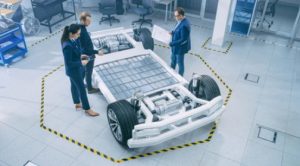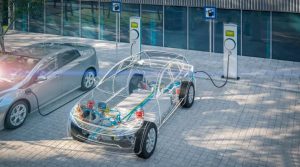The rise of electric vehicles (EVs) is revolutionizing every aspect of automotive design — from powertrains to suspension systems. Among the most affected components are shock absorbers, which must now adapt to new demands created by EV weight distribution, instant torque, and noise expectations. As carmakers push for smoother, safer, and more energy-efficient rides, shock absorber technology is evolving rapidly to keep pace.
Why EVs Change the Game for Shock Absorbers

Traditional vehicles rely on combustion engines and fuel tanks, which result in specific weight distributions and vibration patterns. EVs, however, introduce three major changes:
| Key Factor | Impact on Shock Absorbers |
|---|---|
| Heavier weight | EV batteries significantly increase vehicle mass, requiring stronger and more durable damping systems. |
| Lower center of gravity | The battery’s position lowers the car’s center of gravity, demanding recalibrated suspension dynamics. |
| Instant torque | Electric motors deliver immediate power, putting additional stress on suspension components. |
These changes mean conventional dampers are no longer enough. Engineers are rethinking how shock absorbers are designed, built, and tuned.
New Challenges in EV Suspension Design
1. Increased Vehicle Weight
EVs can weigh 20–30% more than their internal combustion counterparts. This extra mass increases suspension load, leading to faster wear and reduced performance if traditional shock absorbers are used.
Solution: Manufacturers are developing high-pressure gas shocks and reinforced piston designs to handle heavier loads without compromising ride comfort.
2. Vibration and Noise Sensitivity
With no engine noise to mask vibrations, even minor suspension imperfections become noticeable. Shock absorbers must now reduce Noise, Vibration, and Harshness (NVH) to near-zero levels.
Solution: Advanced materials, improved seals, and hydraulic fluid innovations help dampen even the smallest road imperfections.
3. Energy Efficiency Concerns
Every component in an EV must contribute to efficiency. Shock absorbers that waste kinetic energy as heat are less desirable.
Solution: Regenerative suspension systems — still in development — aim to recover some of that wasted energy and feed it back into the battery.
Innovations Shaping the Future of Shock Absorbers
EV-focused shock absorber technology is advancing in several exciting ways:
Adaptive and Semi-Active Dampers
These electronically controlled shocks adjust their damping force in milliseconds based on driving conditions. They are ideal for EVs, which require different damping settings during acceleration, braking, and cornering.
Lightweight Materials
Engineers are experimenting with aluminum alloys, composites, and even carbon fiber to reduce unsprung mass without sacrificing strength.
Smart Suspension Integration
Modern EVs use sensors and AI-driven systems to predict road conditions and adjust suspension performance proactively. These systems communicate with other vehicle components — like traction control and braking — for a seamless driving experience.
Benefits of Next-Gen Shock Absorbers for EVs
The evolution of shock absorbers is not just about handling new challenges — it’s also about unlocking new possibilities. Here’s what modern dampers offer:
-
Enhanced Ride Comfort: Smooth and quiet performance even on rough roads.
-
Improved Handling: Optimized damping improves stability and cornering.
-
Extended Component Life: Stronger construction reduces wear from added weight.
-
Energy Savings: Future regenerative technologies could help improve EV range.
Maintenance Tips for EV Shock Absorbers

Even advanced suspension systems need regular care. To ensure longevity and safety:
-
Inspect shocks every 20,000–30,000 km.
-
Check for leaks or oil residue on the dampers.
-
Pay attention to unusual vibrations or reduced handling performance.
-
Replace worn shocks promptly to avoid additional suspension damage.
Final Thoughts
The shift to electric vehicles is pushing suspension technology into a new era. Shock absorbers are evolving from passive dampers into intelligent, adaptive systems designed to handle unique EV characteristics. As innovation continues, we can expect future EVs to deliver not only zero emissions but also unparalleled ride quality and safety.
If you’re upgrading or replacing your suspension, consider the latest technology designed for modern vehicles. You can buy Shock Absorbers online and choose options tailored for EV performance, comfort, and durability.